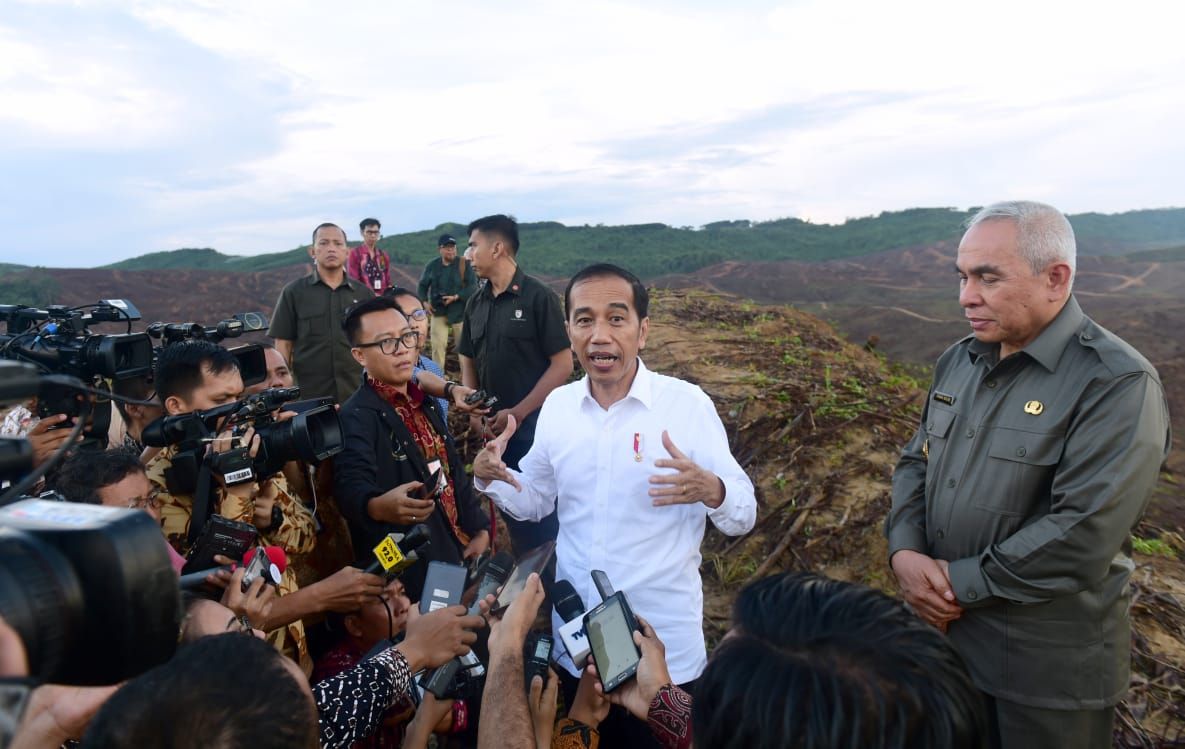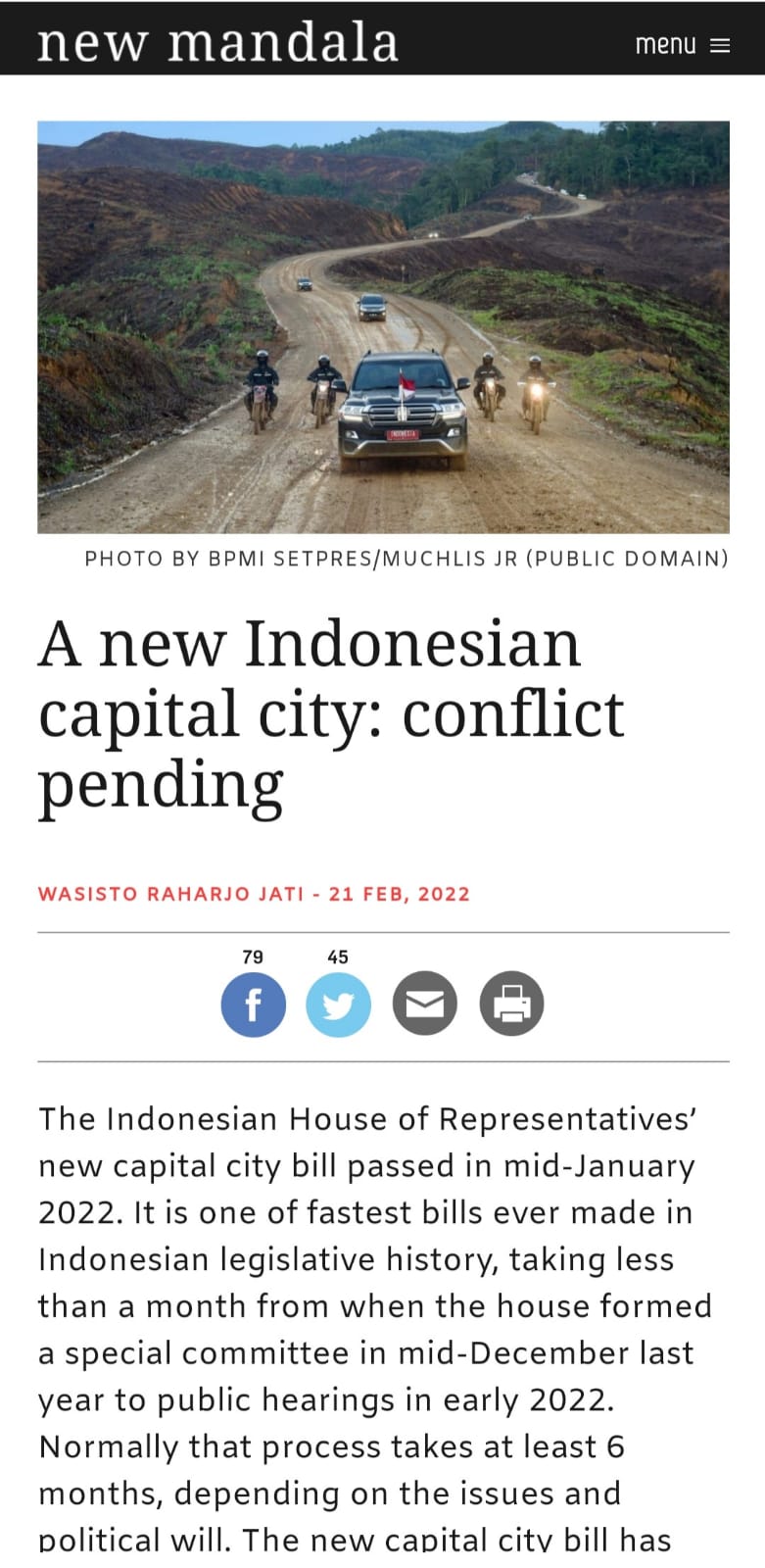PHOTO BY BPMI SETPRES/MUCHLIS JR (PUBLIC DOMAIN)
A new Indonesian capital city: conflict pending
WASISTO RAHARJO JATI – 21 FEB, 2022
The Indonesian House of Representatives’ new capital city bill passed in mid-January 2022. It is one of fastest bills ever made in Indonesian legislative history, taking less than a month from when the house formed a special committee in mid-December last year to public hearings in early 2022. Normally that process takes at least 6 months, depending on the issues and political will. The new capital city bill has many pros and cons. While the government and house hope it will run smoothly, it appears the new capital draft bill did not include the aspirations or perspectives of current residents of the proposed site in Kalimantan. My research reveals that local voices, especially those of adat (customary law) communities have been excluded from discussions of the capital draft bill. Furthermore, another important issue arises in overlapping rules in the new capital location. There are 162 existing natural resources concessions within the core location of new capital and its surroundings. Certainly, these two major omissions from the process contradict with the vision of new capital that is a smart, green, beautiful, and sustainable city.
One important issue to be resolved is the acknowledgment of indigenous land rights. Although the new capital will be established on state land, which is made up of 56.180 hectare for the core area and 199.962 hectares for surrounding developments, this huge area overlaps with existing indigenous land parcels. The Sultanate of Kutai Kartanegara was not invited by national policymakers to discuss the land status of land in the new capital site, although the Sultanate still has traditional land rights on the site. Before joining the Republic of Indonesia in 1959, the Sultanate was an independent polity whose land covered current territory of East Kalimantan Province. The Sultanate has resumed its activities in 1999 after a forty-year hiatus. The site also includes some indigenous communities that use the land for fishing and farming.
However, these traditional owners have been excluded from the discussion too. One local representative from Sultanate told me that, they never get any chance to discuss the new capital city process in formal or informal discussions from the national and local governments. In fact, they have been living in that area for decades. Most importantly, the central government’s bill only mentions Paser, Dayak, and Bugis as traditional owners of the area, and fails to acknowledge the Sultanate and Kutai people. This could create land disputes, as the Sultanate still authorises customary law in managing lands.RELATEDLessons from Brasilia: on the empty modernity of Indonesia’s new capitalIndonesian officials are raising Brasilia as a model for relocating the capital city to East Kalimantan. But Brazil’s experience with Brasilia is not a positive lesson from history, but a warning.DAVID HENLEY AND GIULIA FRIGO 14 APRIL, 2020
The marginalisation of indigenous people will be harmful for the new Indonesian capital city. Conflict between indigenous locals and migrants, particularly those from Java, will likely arise. The national state civil apparatus, an estimated 1,5 million people, will be the dominant group of migrants to East Kalimantan when the new city is established. This huge number of migrants has the potential to disturb local economies and markets, especially in terms of housing and food. If the government does not accommodate the need of locals, this will spark new vertical conflicts. Previously, notable vertical conflicts between the central government and communities in Aceh and Papua have resulted in insurgencies that have lasted for many years. Some of these have been focused one mining issues like oil and gas in Aceh and copper and silver mining in Papua. In the second half of the 20th century, transmigration policy generated horizontal conflict between Javanese migrants and local populations in several provinces outside Java. Therefore, the lesson to be learned from previous conflicts triggered by this New Order developmentalism is that acknowledging traditional land rights and meeting economic needs through fair compensation may satisfy locals in the new Indonesian capital city development projects.
The design for the new capital features concentric “rings” with parliament, ministries, government occupying the two central rings, business districts in the second ring and residential areas in the third. The location of new capital also overlaps with 162 current coal-mining concessions covering 203,720 hectares, three times the area of Jakarta. The owners of these concessions are large conglomerates who have close relationships with national elites. The mine owners are also attached to the inner political circle of Jokowi’s administration. Hashim Djojohadikusumo, younger brother of current Defence Minister Prabowo Subianto, has concessions that cover 173,395 hectares in the second ring, and business interests of the Coordinating Minister for Maritime & Investment Affairs Luhut Binsar Pandjaitan own land almost 17,000 hectares in the second and third rings. Significantly, most of these mining companies have huge mines on the site. This includes 94 coal mining holes that are supposed to be restored through environmental provisions.
Photo: BPMI Setpres/Muchlis Jr (public domain). President Jokowi and his entourage at the new capital city site, including Minister of National Development Planning/Head National Development Planning Agency Suharso Monoarfa, Minister of State Owned Enterprises Erick Thohir, Minister of Public Works and Public Housing Basuki Hadimuljono, Minister for Environment and Forestry Siti Nurbaya, Minister for Agriculture and Spatial Planning Sofyan Djalil, Minister for Internal Affairs Tito Karnavian, dan Cabinate Secretary Pramono Anung.
The Indonesian Mining Advocacy Network (JATAM) has underlined there is lack of transparency and poor public participation in the process of identifying land to be granted to concession holders in exchange for concessions that have been reclaimed. This risks disenfranchising or displacing locals whose land is caught up in these exchanges, which could potentially generate social conflict. These facts, however, lead the public to the belief that conglomerates will be relieved of responsibility for reparations of the disastrous environmental impacts of their mining if they agreed to financially support the new capital city. This, again, contradicts with the vision of a capital that promotes a green and sustainable city development. The future Indonesian capital may be no better than Jakarta if it is built on vulnerable and fragile environments. The alignment of interests between business and politics should be refused in the making of a new capital city. These has leads one civil society organisation, the National Axis for State Sovereignty (PNKM) to file a lawsuit against the new capital city bill through the constitutional court. They argue that the new capital city is not part of the long-term national development project 2005 to 2025, and therefore unconstitutional.
In sum, the whole picture of new Indonesian capital city still leans to the elites rather than the people. Recently, more than 24.000 people have signed an online petition rejecting the capital moving from Jakarta to East Kalimantan because of concerns about the COVID-19 situation and state budget deficits. Many groups are in opposition, especially those already living in the area. Acknowledging their existence and accommodating their needs is the key to building an inclusive Indonesian capital city for all.
Source: https://www.newmandala.org/a-new-indonesian-capital-city-conflict-pending/

